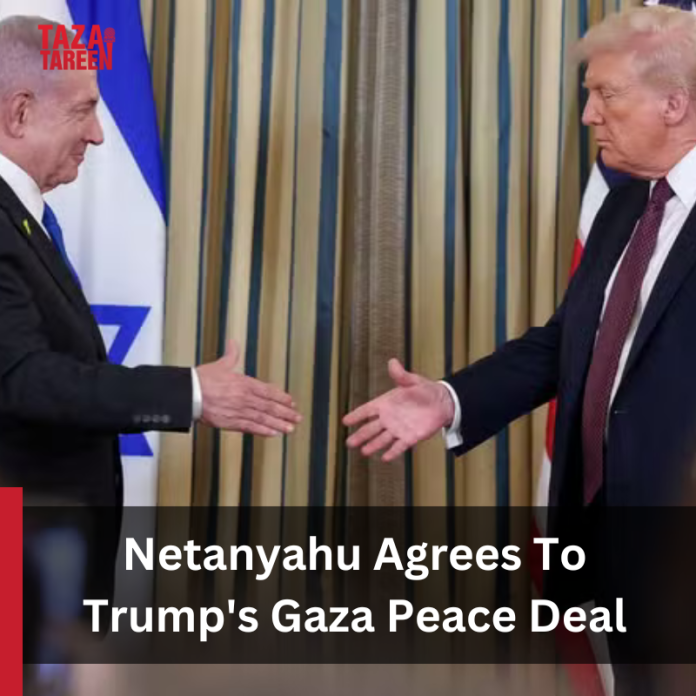On September 29, 2025, former U.S. President Donald Trump introduced Trump’s Peace Plan, a comprehensive 20-point proposal designed to end Israel’s ongoing war on Gaza. The announcement, delivered alongside Israeli Prime Minister Benjamin Netanyahu, marked one of the most significant diplomatic proposals since the conflict reignited. While Trump framed the plan as a path to stability, Netanyahu reinforced Israel’s determination to continue its military campaign if Hamas rejects the terms.
Trump’s 20-Point Peace Proposal
Trump’s proposal was presented as a bold initiative to balance humanitarian concerns with Israel’s security needs. The key elements included:
- Ceasefire and Governance: The plan calls for the establishment of an interim governing body in Gaza, one that would exclude Hamas from any official role. This administration would oversee reconstruction and provide basic services.
- Prisoner Releases and Amnesty: Trump emphasized the release of captives and proposed amnesty measures for some Palestinian factions as confidence-building steps.
- “Board of Peace” Oversight: Trump declared that he himself would chair a “Board of Peace,” supervising the transitional arrangements in Gaza.
- Security Guarantees: While advocating for negotiations, Trump made it clear that if Hamas rejects the plan, the U.S. would give Israel its full backing to “finish the job.”
- Limits on Annexation: Notably, Trump rejected the annexation of the West Bank, signaling a departure from hardline Israeli policy stances.
- Regional Integration: He suggested the possibility of Iran joining the Abraham Accords, opening the door to unprecedented regional diplomacy.
Netanyahu’s Response
Prime Minister Netanyahu welcomed Trump’s peace plan, calling it consistent with Israel’s war objectives. His statements, however, underscored a hardline position:
- Conditional Support: Netanyahu stressed that if Hamas refuses the terms, Israel will continue its military operations until its goals are achieved.
- Defiance at the UN: Speaking at the United Nations General Assembly, Netanyahu accused critics of siding with Hamas by pushing for a two-state solution during wartime.
- “Sparta Speech” and Self-Reliance: In a separate address, Netanyahu warned that Israel faces growing economic and diplomatic isolation, urging the nation to adopt a self-reliant “Spartan” model to withstand global pressure.
- Dismissal of Genocide Claims: Netanyahu strongly rejected accusations of genocide, branding them as politically motivated “blood libels” against Israel.
Global Reactions
The joint appearance of Trump and Netanyahu drew sharp responses from international leaders and analysts. Critics argue that Trump’s plan sidelines Palestinian political aspirations, while supporters say it offers a pragmatic framework for halting violence. Human rights organizations warned that excluding Hamas could prolong instability, while regional observers noted the surprising mention of Iran’s potential participation in peace accords.
How Trump’s Gaza Peace Plan Could Impact Pakistan
Former U.S. President Donald Trump’s 20-point peace proposal for Gaza, announced on September 29, 2025, has triggered debate not only in the Middle East but also across South Asia. While Pakistan was not mentioned directly in Trump’s speech, several elements of the plan could have indirect consequences for Pakistan’s foreign policy, domestic politics, and regional standing.
Trump’s Plan in Brief
The peace plan aims to end Israel’s war on Gaza by:
- Establishing an interim governing authority in Gaza without Hamas involvement.
- Facilitating prisoner releases and amnesty measures.
- Creating a “Board of Peace” chaired by Trump to oversee implementation.
- Guaranteeing U.S. support for Israel if Hamas rejects the plan.
- Rejecting the annexation of the West Bank.
- Suggesting Iran’s potential entry into the Abraham Accords.
Implications for Pakistan
1. Heightened Public Sentiment
Pakistan has historically supported Palestine and rejected recognition of Israel. Trump’s unconditional pledge to back Israel could fuel strong public anger in Pakistan, where pro-Palestine protests already dominate the streets. The government may face mounting pressure to adopt a tougher stance.
2. Policy Dilemma on Two-State Solution
By rejecting West Bank annexation but sidelining Hamas, Trump’s plan complicates the Palestinian political landscape. Pakistan, which consistently advocates a two-state solution, may find its diplomatic messaging more challenging, especially within the OIC and the United Nations.
3. Iran Factor and Regional Realignment
Trump’s suggestion that Iran could join the Abraham Accords is particularly significant for Pakistan. As Iran’s neighbor and occasional strategic partner, Pakistan would have to recalibrate its regional diplomacy. If Iran normalizes ties with Israel, Pakistan may face new pressure from allies and domestic groups on whether to maintain or reconsider its rigid stance.
4. Strains within the Muslim World
The plan risks deepening divides within the Muslim world—between countries aligning with U.S.-Israeli diplomacy (such as Saudi Arabia and the UAE) and those opposing it (like Turkey and Qatar). Pakistan, often balancing between these blocs, will need to navigate carefully to avoid isolation.
5. Domestic Political Impact
Religious and opposition parties in Pakistan are likely to use Trump’s proposals to attack the government, portraying it as weak on the Palestine issue. Public protests, similar to those seen in the past over Israel, could intensify, influencing internal stability.
Trump’s Gaza peace plan may not mention Pakistan by name, but its ripple effects will be felt in Islamabad. From managing street protests to balancing regional alliances, Pakistan faces a complex challenge: defending its long-held pro-Palestine stance while navigating a shifting geopolitical landscape shaped by U.S., Israeli, and regional interests.
For Pakistan, the real test will be striking a balance between public sentiment and international diplomacy, ensuring that domestic politics do not compromise strategic foreign relations.
Conclusion
Trump’s 20-point peace plan and Netanyahu’s endorsement reflect a pivotal moment in Middle East diplomacy. While the plan positions itself as a roadmap to peace, its success hinges on acceptance by Palestinian leadership—a scenario many consider unlikely. For Israel, the speeches reinforced a narrative of resilience and defiance amid growing global scrutiny. For Trump, the initiative reasserts his role as a central figure in international negotiations, even outside the Oval Office.
Whether this plan represents genuine progress or another chapter in stalled Middle East peace efforts remains to be seen.
FAQs:
Q1. What is Trump’s 20-point Gaza peace plan?
Trump’s plan outlines steps to end the war in Gaza, including a ceasefire, the creation of an interim governing authority without Hamas, prisoner releases, amnesty measures, and reconstruction. He also proposed chairing a “Board of Peace” to oversee implementation.
Q2. Why did Trump reject West Bank annexation?
Trump stated that annexation would undermine peace efforts and fuel further instability. By rejecting it, he signaled a more balanced approach compared to previous hardline positions.
Q3. How did Netanyahu react to Trump’s proposal?
Netanyahu welcomed the plan, calling it aligned with Israel’s war goals. However, he warned that Israel would continue military action if Hamas refused to accept the terms.
Q4. What role does Hamas play in the plan?
The proposal excludes Hamas from governance in Gaza. Instead, an interim body would administer daily affairs, reconstruction, and aid distribution.
Q5. What did Netanyahu mean by a “Sparta model”?
In his “Sparta Speech,” Netanyahu urged Israel to adopt economic and diplomatic self-reliance, comparing it to ancient Sparta’s resilience in the face of adversity.
Q6. How does the plan affect Palestinian aspirations for statehood?
Critics argue the plan sidelines Palestinian statehood by excluding Hamas and offering no clear path toward sovereignty. Supporters say it prioritizes security and stability first.
Q7. What global reactions has the plan received?
International leaders offered mixed responses. Some praised it as a realistic attempt at peace, while others criticized it for ignoring Palestinian political rights. Human rights groups warned it may prolong instability.
Q8. Did Trump mention Iran in his speech?
Yes. Trump suggested Iran could eventually join the Abraham Accords, a surprising element that could reshape regional diplomacy if realized.


